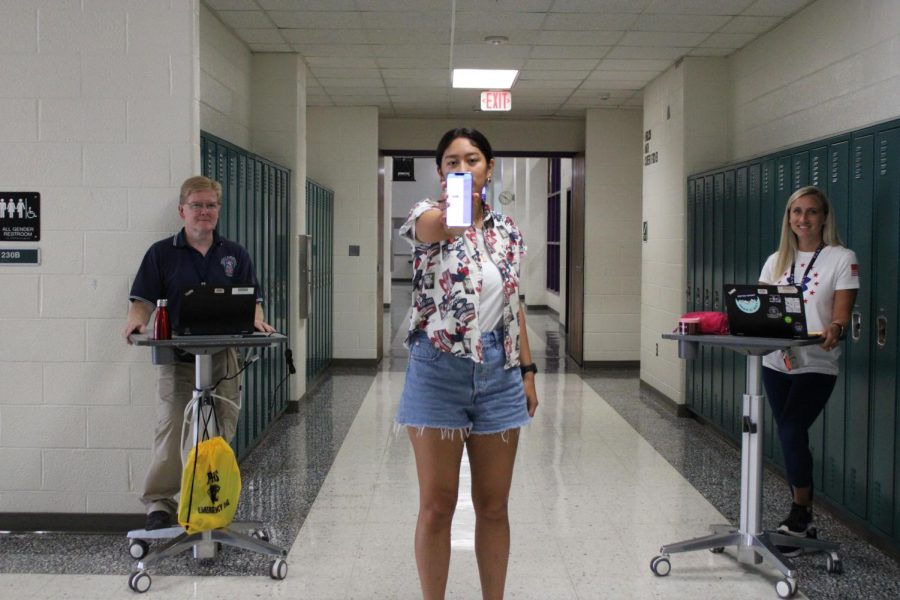Opinion: Newly implemented rules at Potomac Falls are ineffective in controlling students- and may be overkill for Upperclassmen
Photo by: Molly DeHaven
Students have noticed an increase in hall monitors and stricter in class rules but how beneficial are these rules, really?
When the 2022-23 school year began, new rules also came into effect, and the impact it had on students’ in-school experience was immediately heard. One of the first things announced in advisory was a new school-wide phone policy.
In an email sent out by principal Dr. Brandon Wolfe on Aug 23, a new phone policy was introduced and detailed how phones should be away and out of sight during class time. This includes not being able to listen to music while doing independent work.
On top of the new phone policy, hall monitors were reintroduced this year, and there is a heavier emphasis on using the website “e-hallpass” to track student activity when leaving classes. In past years, there were no school-wide regulations about phones; instead, teachers implemented their own rules on a class-to-class basis. However, this year there is a more stringent protocol in place regarding phone usage, and students are feeling the impact.
While Wolfe stated he received a handful of positive parent emails following the announcement of the phone policy, and the policy received applause from teachers at a faculty meeting, this increase in strictness is not favored by students. Some say that these new rules created a foundation of distrust between the administration and the students. Being stopped every time you are in the hallway to check for a pass gives the impression that every student is up to something bad. Walking out of the cafeteria, passing five teachers, and being asked two to three times where we are going, makes students feel as if the teachers have no faith in them. Whereas teachers may find this asking tactic to be helpful, and controlling the behavior in the hallway, for certain students it feels like a sign of un-trust. Especially for upperclassmen who have worked for the past few years to prove their responsibility.
Throughout high school, especially in junior and senior year, there is a great emphasis on being responsible and preparing yourself for the real world. In dual enrollment classes, juniors and seniors are always being told that it is a college class. When teachers are scolding their class, they always bring up the real world. Constantly teachers are reminding the reality, there are less strict rules found in college and beyond. In college, there aren’t hall monitors constantly asking where you should be. If the teachers started treating students like adults, then they’ll start truly acting like adults.
Students have the ability and strength to stay off their phones and if not, it should be up to the teachers to implement rules in their own classroom. In classes where teachers are more engaging, students tend to stay off their phones and actually pay attention. When students get bored, they tend to migrate to their phones as a source of entertainment. By keeping a class interesting and keeping students engaged, students tend to put the phone down. At the end of the day, if a student does go on their phone during teaching, they are only hurting themselves by not paying attention and should be learning that their actions have consequences. For upperclassmen, this is a time in their lives where they must learn how to self govern themselves. Majority of the teachers understand and know the productivity and maturity level of their students. After all, it is their classroom and their environment being changed.
Understandably, from the point of view of teachers, having students on their phone is disrespectful. Teachers have put time and effort into their lessons, and seeing students not paying attention is unproductive. So if a teacher notices many students not paying attention, allow the teacher to apply their own version of the rule. If one teacher sees students participating and paying attention in class, let the teacher allow the students to have phones out or allow the students to listen to music during individual work. Many students believe they work better with music and it doesn’t harm others.
While there are students who may abuse the privileges, is it fair to punish the majority that adhere to the rules? It is understandable to have hall monitors in the halls, but is it really necessary to have two in every hallway? Is it necessary to have multiple teachers standing outside the cafeteria? In order to ensure there are no students leaving or entering the school unauthorized, hall monitors could be by the exits of the school. If the administrators want students to act like the soon-to-be adults they are, treat students like adults and have some faith in the student body.


